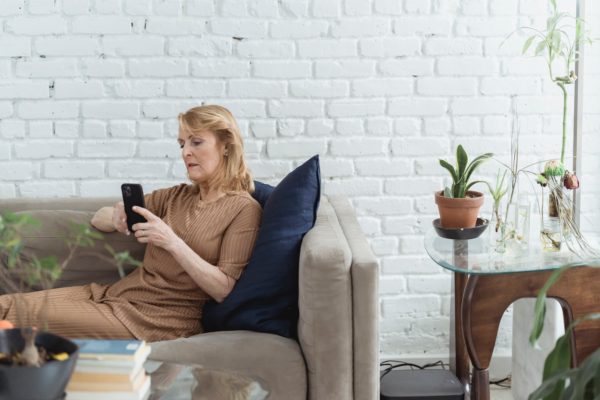Mental health app development is on the rise now, driven by the growing awareness about the importance of emotional wellbeing, and, to some extent, by the limitations that the covid-19 pandemic has imposed on in-person visits to therapists. All in all, the market value of mental health apps is predicted to exceed US$3,709.2 million by 2027.
Using an app is faster, safer, and less expensive than going to therapy. Moreover, in regions where some social stigma still exists about mental health issues, digitized mental healthcare offers confidentiality that is otherwise impossible to guarantee.
In this blog, we will list the existing mental health app types and their core features, as well as how much a mental health app costs. On top of that, we will also talk about how to create apps that are good for mental health, and take you through all the key phases of their development. We will also discuss the efficiency of mental health apps and what you should do to make them deliver on the promise of bringing inner peace. Read on to learn more!
Defining Mental Health App Development
If you’re new to mental health app development, it would make perfect sense to define it first, before we get into specifics. So what are mental health apps, in the first place?
Mental health apps are used to treat mental and emotional wellness issues: from minor mood swings and stress to severe anxiety, depression, and serious psychiatric conditions. The functions of such apps may be as simple as tracking users’ emotions and providing inspirational quotes, or they may be complex and sophisticated such as, for example, large platforms connecting patients and licensed therapists that specialize in various branches of treatment.
Currently, there are around 20,000 mental health apps in app stores, including basic self-help solutions and apps for mindfulness and meditation. All in all, mental health apps fall into the six basic categories:
1. Chatbots
Mental health bots emulating a client-therapist conversation. For example, Woebot, a brainchild of Stanford University graduates, is based on artificial intelligence and CBT therapy principles and helps alleviate anxiety and depression.

2. Educational apps
Apps like Moodfit and MoodMission not only track users’ moods but also educate them on alarming symptoms and help them learn basic self-care tips and coping techniques.
3. Teletherapy apps
Platforms and marketplaces like Talkspace connecting patients to licensed therapists and providing a safe and confidential environment for remote in-person visits.
4. Self-improvement apps
These types of apps help boost motivation, increase confidence and reach specific personal goals. An example of such an app is Happify. Based on positive and CBT therapy principles, this app offers games and activities for improving users’ quality of life. A subcategory of these apps is dedicated to fighting addictions and substance abuse and helps users follow through on their decision to get rid of bad habits.
5. Mood tracking apps
It’s no secret, moods, and attitudes can act as important indicators for critical mental health conditions. If you want to develop an app for tracking mental health, check out mood tracking apps like Sanvello that help users to monitor their moods on a daily basis and provide actionable tips on confronting negative thoughts and changing self-defeating behavior patterns.
6. Apps addressing specific mental health conditions
There’s also a vast category of apps helping people handle a particular mental health condition, such as schizophrenia, or bipolar disorder. Major depressive disorder is the second most common mental disorder worldwide, so you may want to consider making a mental health app for depression to fill the growing market demand. Anxiety disorders, however, such as generalized anxiety, social anxiety, post-traumatic stress, specific phobias, and OCD are the most widespread ones, with the total number of people in need of help estimated as 284 million.

At Empeek, we have successfully developed a mental health app for individuals dealing with depression and anxiety. Our solution facilitates group collaboration, helps people discuss problematic issues, and connects them to mental health professionals on-demand.
Mental health apps may also offer a combination of the above-listed features. A mood tracking app, for example, may also enable users to schedule appointments with certified therapists, if necessary. Also, apps combining mental health with other healthcare domains like endocrinology and diabetes treatment are not uncommon. Such apps take a holistic approach to human health and enable patients to track and manage different aspects of their wellbeing.
Of course, no app will fully replace an in-person treatment. Nevertheless, apps using algorithms based on evidence-based approaches, such as Cognitive Behavioral Therapy, can provide users with self-help techniques and support patients in between therapy sessions. If you’re looking for solid proven clinical expertise and efficiency, think if you could make a behavioral mental health app.
How Mental Health Apps Work with Customers
Creating a mental health app is hardly possible without having a clear understanding of how these apps work. The may principles of how mental health apps interact with customers include:
- Tracking users’ conditions and delivering personalized information to help them tackle mental health issues;
- Connecting patients with mental health professionals on-demand and providing a protected environment for their interactions (via video, audio or messaging);
- Providing access to support groups of users who share similar experiences;
- Using gamification to boost users’ progress in achieving specific goals, and teaching them new skills, or helping battle addictions.
An important question to ask if you want to start creating apps that improve mental health, is which monetization options are available? In other words, how are you going to make money with your app? Here’s a list of strategies uses by most popular wellness solutions.
In-app advertising
It’s either pay per click or pay per view model. You can earn money by showing users relevant in-app ads.
Freemium model
While some portion of the app features is free, the full application version is only available on a paid basis.

In-app purchases
A marketplace connecting patients and therapists, for example, may charge royalties for each session and fees for monetary transactions.
Subscription model
A monetization method used by top-rated mental health apps. Users have to pay to renew their subscriptions on a regular basis.
Surely, existing monetization approaches aren’t limited to those listed above, and you are welcome to use other options if you plan to create an app to help with mental health.
A Tech Stack for Making a Mental Health App
If you’re wondering how to develop mental health app, you need to learn about the latest technologies used to power the best-of-breed software in this segment. Below is a typical tech stack for building mental and emotional health app.
Prototyping and design
To create all the product documentation and list all the application requirements, you will need the full assortment of G-Suite tools, Balsamiq Wireframes for prototyping, and Figma for interface design. This set of tools is enough to shape up the app concept before you plunge into the development of mental health apps.
Coding
Once you’re done with prototyping, you are ready to proceed to the coding phase. We recommend that you use React Native for mobile development, React.Js for frontend, and Lavarel PHP framework for server-side development.
On top of that, you will also have to integrate your app with the most common third-party services, such as social sign-ups, push notifications, and geolocation. We recommend that you use OpenID, Firebase Cloud Messaging, and Google Maps or Core Location API respectively. Use platform-specific SDK for payment processing gateways.
Server and Hosting
You need a scalable and reliable cloud infrastructure for hosting your application. AWS Cloud has the reliability and security you need. Further, you will need to choose servers for running application services. At Empeek we recommend choosing Jitsu for streaming, LoadNinja for testing, and MySQL as a database server.
Core features of mental health apps
Making a mental health app will involve enhancing it with features that will distinctly differentiate it from other apps in this segment. Yet, some features are an absolute must. For example, here’s what a set of teletherapy app features could look like:
For patients
Sign-in/Sign-up: Patients should be able to sign up in order to set up their user profiles, and sign in to use the app.
User profile: The user profile is a mandatory feature for a mental health app. Think which information is absolutely necessary, since people with anxiety and depression may be unwilling to share their personal details.
Tracking and monitoring: Tracking thoughts, moods, important milestones, and achievements is important for mental health app users. Make sure this feature is also present in your app.
Matching therapists and patients: This feature is an absolute must for teletherapy platforms offering remote client/therapist consultations.
Remote communication tools: The messaging, audio, or video chat options should also be present if you’re making an app connecting doctors and patients.
Communities and user groups: Communicating with people who share the same problems can be helpful and supporting in itself, so make sure to include this feature in your mental health app.
For therapists, consultants, and psychiatrists
Sign-in/Sign-up: The app should enable therapists and consultants to quickly sign up into their profiles.
Doctor’s profile: The profile of a consultant should be more detailed than the patient’s profile and should provide in-depth information about their license and qualification.
Calendar: This feature should contain all appointments and free-time slots and facilitate the scheduling of therapy sessions and managing their practice.
Dashboards and treatment plans: The app should also enable doctors to build treatment plans for patients and see how they progress.
Other important requirements for mental health apps
What makes a great app? Once you figure it out, you will learn how to build mental health app that users will love.
Usability: great user experience is what one will expect from a mental health app. An attractive design will only make it more enjoyable.
Performance: low latency and capability to operate in offline mode is what users will expect from a mental health app. If you’re building an online therapy solution, make sure it can scale with an increased number of users and support intense workloads.
Security: SSL certification, advanced network protection, as well as compliance with data security regulations and requirements are mandatory.
Availability: your app should have a mobile and desktop version and run ioS and Android, as well as other widely used operating systems and platforms.
How to Create a Mental Health App: Points to Consider
If you’re wondering how to build a digital mental health app, there are some niche-specific aspects you should bear in mind. Most importantly, you should focus on your users’ needs if you want your app to be successful. Understanding your audience will help you offer an effective solution to their problems.
Who will be using your app? What services will it offer, and will your app include support from doctors and mental health professionals? These are the questions you should ask if you’re thinking about developing apps that help with mental health.
All in all, important aspects to consider are as follows:
Clinical basis
If you’re making an app for serious mental health issues, and psychiatric conditions, make sure the tips and advice you are offering are based on clinical expertise. These are several therapeutic approaches, backed with research and a vast body of clinical evidence. Partner with practicing doctors and psychiatrists, to create an app that is truly helpful.

Testing for efficiency
How helpful is your app? Testing for efficiency should be an integral part of your quality assurance procedure, along with usability and performance testing. There are too many apps on the market that aim to be helpful but have been reported inefficient in terms of dealing with difficult mental health conditions. Test your app with a focus group before the final release.
Emergency contact feature
Panic attacks, severe depression, suicidal thoughts, or nervous breakdowns are not uncommon among users of mental health apps. The app you build should enable users to instantly contact their therapists and/or caregivers in case of an emergency.
Your audience and their needs
Knowing the age, income, social status, cultural background, and other demographics of prospective app users will help you envision how your app will integrate with their daily lives and decide on other important aspects of app/user interactions. How much time will they be capable to spend interacting with your app? How often should the app be sending notifications? How can you avoid triggering annoyance and anxiety, as well as appearing too aloof or intrusive? Studying your audience will help you eliminate the guesswork.
User Experience
When it comes to the user experience, every little thing matters. The look, feel and sound of your app should get your users in a better mood, and make them feel hopeful and optimistic. Pay special attention to the design and usability of your mental health app and the emotional response that it generates in users.
Gamification features
This will mostly apply to self-improvement apps aimed at helping users achieve specific goals. If you want to motivate users to reach important milestones or give up bad habits, consider using gamification to boost their motivation levels. You may give out symbolic awards and badges, or trigger competition between users (if applicable).
Tone of voice
People seeking psychological help get easily triggered and offended by communication ambiguities they may perceive as hostile or judgemental. Pay special attention to the tone of voice of in-app communication. Make sure all discussions in user groups are thoroughly moderated.

Integration with other services
Offering your users some extra services will definitely boost your app value. You may, for example, partner with clinics and pharmacies for medication delivery, free check-ups, and discounts.
Privacy and сonfidentiality
Compliance with privacy and data security guidelines and regulations is a must when it comes to safety and data protection. Users of mental health apps expect them to be secure and may prefer digital assistance to in-person treatment exactly for this reason. Failing to meet their expectations is a major breach of trust, so take the privacy and security of your app as a priority.
If you’re in the United States, your app may have to comply with HIPAA law, especially if you plan to build a platform for matching doctors and patients. Private and public clinics and standalone practitioners are HIPAA-covered entities. The sensitive information patients share with these entities as well as healthcare data is subject to protection, and your app has to comply with the HIPAA standards. An app for self-help and personal use will not be required to be HIPAA-compliant.

If you plan to offer consultations via your app, the US law requires all the therapists and consultants to be licensed and work in full compliance with their state laws.
If you work under the EU legislation or plan to target users located in the European Union, your app will have to comply with the GDPR. The GDPR regulation covers all digital businesses in the EU that deal with customers’ data, regardless of an industry or business segment.
Consider using advanced encryption and authentication techniques to safeguard users’ accounts. For example, biometric authentication, using voice, iris scans or fingertips will make users’ accounts difficult to hack and ensure an extra level of protection.
How Much Does a Mental Health App Cost
Creating apps requires both time and investment, and mental health apps are no exception. At Empeek we will be looking at three important factors:
Scope: the audience and topics you want to address will determine the scope of your app. For example, an app targeting users with social anxiety and connecting them with doctors in a particular metropolitan area will have a narrower scope than an app for patients with major depressions and all types of anxiety disorders, matching them with therapists across the country.
Application type: Platforms for teletherapy are more complex than apps for self-care, that require no patient-doctor interaction. Hence, more time and effort will be required to build them, and the price will differ accordingly.

Cross-platform availability: A cross-platform app, working on a wide range of devices and operating systems, will cost more than an app for IOS or Android only.
In a nutshell, a beta version of a self-help app will cost you around $40,000, while the price for more complex solutions starts at, approximately $60,000. The ultimate price, however, will easier to calculate after the solution has passed its product discovery stage, and all the development guidelines and requirements are clearly mapped out. With Empeek R&D based in Lviv, Ukraine, we offer great quality for reasonable pricing, as the cost of development is considerably lower than in Western Europe and the USA.
Consider Our Company Your Trusted Partner
At Empeek we specialize in building software solutions for healthcare. We see our mission in improving modern healthcare standards by implementing digital technologies across such domains as IoT and CRM systems, EHR development, and medical device software. A seasoned IT partner for many clinics and healthcare companies, we have handled a vast range of projects – from building small applications to large enterprise-grade systems.
If you need a reliable development partner with the proven expertise in creating mental health apps, look no further. As said above, our previous experience includes building a mental wellness app for handling stress and anxiety. The platform is now recommended by many clinics and mental health professionals in the US in support of traditional therapy and offers patients self-help and telehealth modules, as well as access to user support groups. Needless to say, patients’ confidentiality is fully protected as the platform is HIPAA compliant.
At Empeek, we will help you create a mental health app that is truly efficient and meets the highest standards and requirements.
Final Thoughts
The demand for digital mental health solutions is high these days, and it looks like it is going to remain so, even after the coronavirus pandemic subsides. As the stigma about mental health issues dissolves, people are increasingly more willing to take the proactive approach and do something about them. In this regard, mental health apps are accessible and affordable means of getting help.
Yet, mental health app development is a relatively new segment, and there’s still a lot of room for improvement. Efficiency and security are some of the most vulnerable spots in mental health solutions available in app stores today. The good news is – addressing these issues by ensuring regulatory compliance and applying evidence-based clinical expertise will let you win the competition and stay ahead of the curve.
Have a mental health app idea that you want to bring to life? Get in touch with us now and we’ll contact you any time at your convenience!








